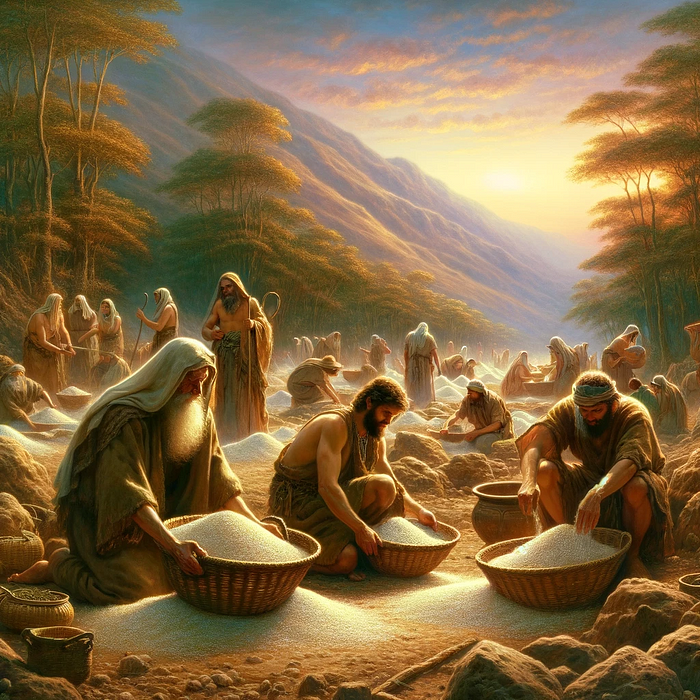
Manna is first mentioned in the Bible in Exodus 16
when the Israelites, wandering the Sinai Desert after leaving Egypt, (Egypt represents the bondage of sin) begin complaining to Moses about the shortage of food. God promises
Moses to “rain bread from heaven” to feed the people. “In the morning
there was a layer of dew round about the camp. And when the layer of dew
was gone up, behold upon the face of the wilderness a fine, scale-like
thing, fine as the hoar-frost on the ground.”
The Israelites asked “What
is it?” or “Mann hou?” in ancient Hebrew, and that was the origin of the name manna (mann in
modern Hebrew). In the same chapter, manna is described as “like
coriander seed, white; and the taste of it was like wafers made with
honey.”
Manna came with its own user manual. People were
instructed to gather exactly as much as they needed every day and never
to save it, as the precious food would spoil. Manna would appear six
days a week, and on Friday they were instructed to gather twice as
much—since there would be no manna coming down on Saturday, the day of
rest. The extra portion for Shabbat, the Israelites were promised, would
not spoil.
The description of manna in the Bible matches what Danin
found in the Sinai Desert. He soon discovered that the white drops on
the shrub’s stems were the digestive byproduct of insects that feed on
the plant’s sap, known as honeydew. The secretion, formed at night, is
loaded with sugar. The sweet liquid hardens to the form of white
granules and is still collected from spring to early fall in many places
in the Middle East today. Manna is produced by "substance exuded by the tamarisk tree".
What is the significance of the tamarisk tree in the Bible?
Why did Abraham take the time to plant such a tree? We might
deduce that there was much to celebrate in Abraham's life and so he
creates a monument to declare God's provision. The tree represents YAHWEH, the Everlasting God who blessed him with a child, a peace treaty, and a water supply. Another very important reason was that God blessed the tamarisk tree to multiple so the Israelites would have plenty of wholesome food in the desert.
The tamarisk tree has several spiritual meanings, including: Strength and Resilience
The tamarisk tree is able to survive extreme conditions, such as heat, fires, and dry spells. This can serve as a reminder that with faith and determination, one can overcome any obstacle.
Jesus Provides a Supernatural Manna
Jesus tells his followers that he provides supernatural provision for all needs, and that he is the true bread from heaven. He says, "I am the bread of life. Whoever comes to me will never go hungry, and whoever believes in me will never be thirsty". ~
John 6:30-35. The manna that sustained the Israelites was a foreshadowing of the sacrifice of Christ. The manna mentioned in Revelation 2:17 is also a symbolic reference to Christ.
Jesus
says, "Your fathers ate the manna in the wilderness, and they died.
This is the bread that comes down from heaven, so that one may eat of it
and not die. I am the living bread that came down from heaven. If
anyone eats of this bread, he will live forever".
~ John 6:48-58
Food is Satan's Secret Weapon
When the Hebrews went to Egypt in search of food, they ended up in slavery. Today many Christians are slaves to food. Obesity is epidemic in the American Church.
False teachers tell their congregation to ignore
God's health and food laws. Satan loves this teaching because it destroys health and turns God's people to the sin
of pharmaceutical witchcraft.
Satan has turned the entire food industry into a weapon of toxic chemical laden food.
God never forces people to do what is right and good. HE gives us a choice. Which "manna" do you want to gather? Come judgment day which do you prefer, smoking or non-smoking?
The
purpose of Renew Your Strength Bible Study Group is to get people to
think about what they believe and why they believe it, not debate who's right or wrong.
Over the years, as Renew Your Strength has continued to
grow in the grace and knowledge of our Lord Jesus Christ, we have
recognized that some of the things we once held as true, in fact, are
not; and therefore we will not “cast in stone” a statement of our
beliefs. We reserve the right to be wrong and to repent of such error
when we discover it.
To
learn the revealed truth of God we must know and understand the true
meaning of the words God inspired to be written. Use Strong's
Concordance to check the original word before it was translated. Do your own research, make up your own mind, rely on the Holy Spirit to guide you.
